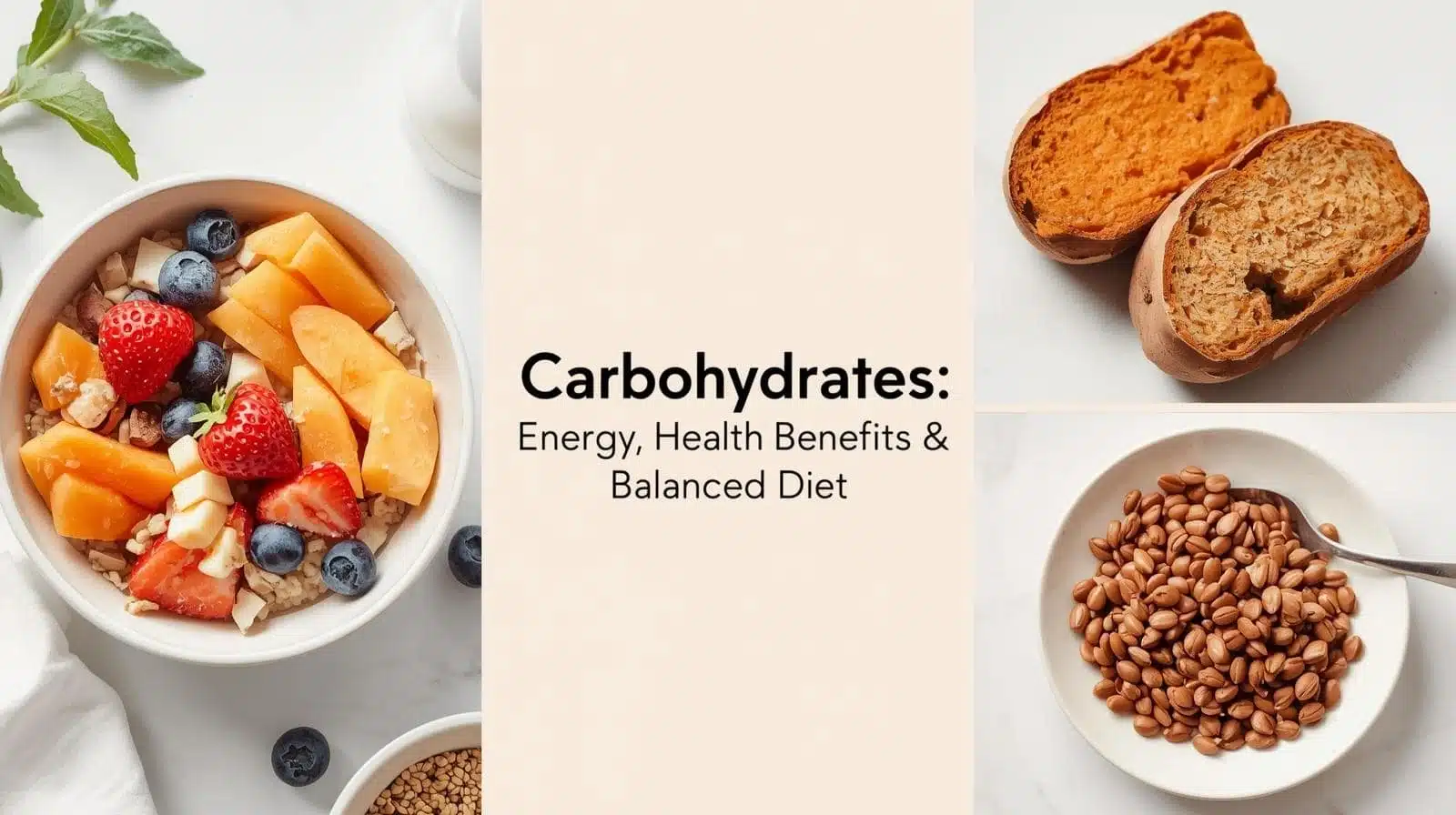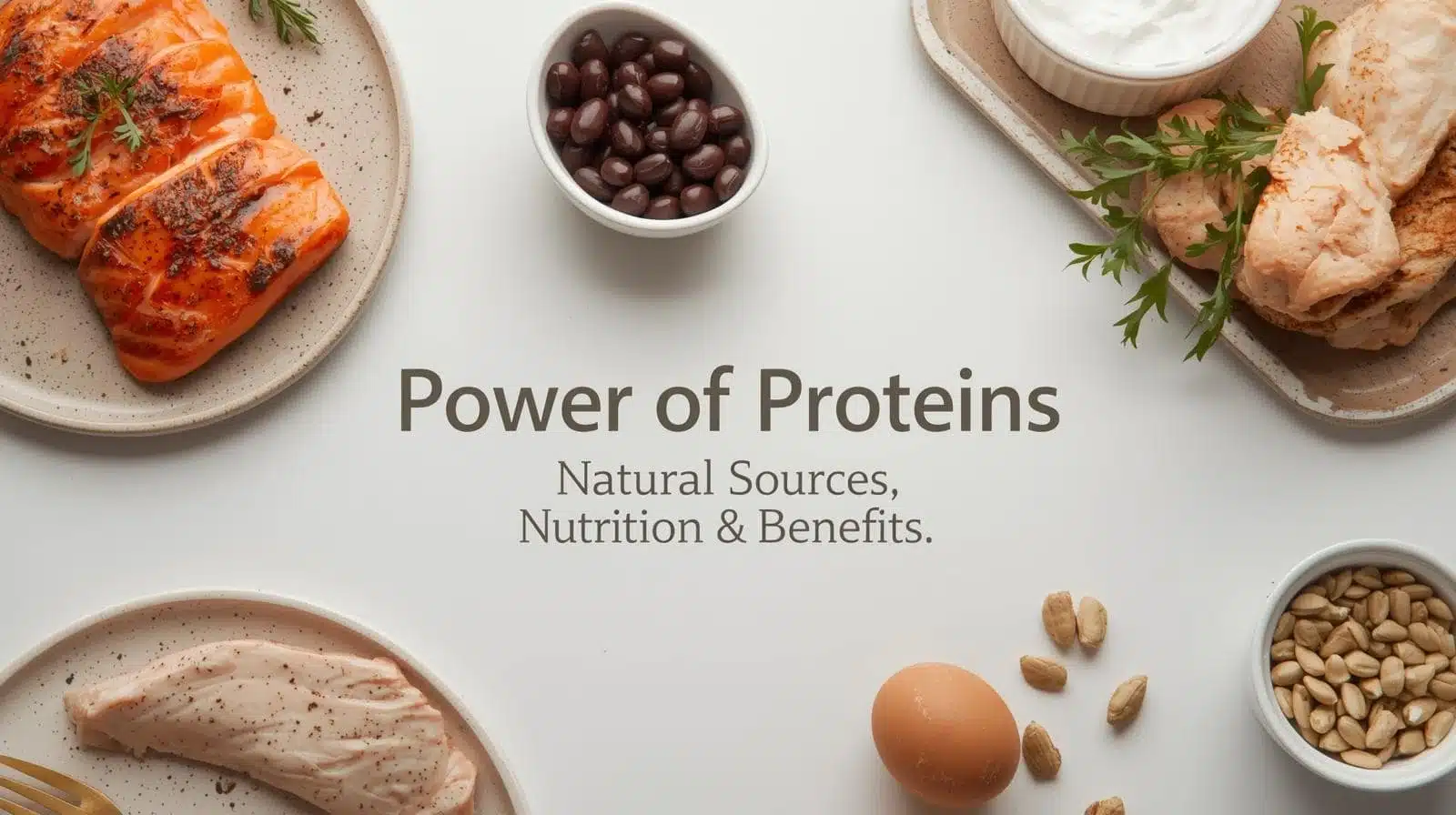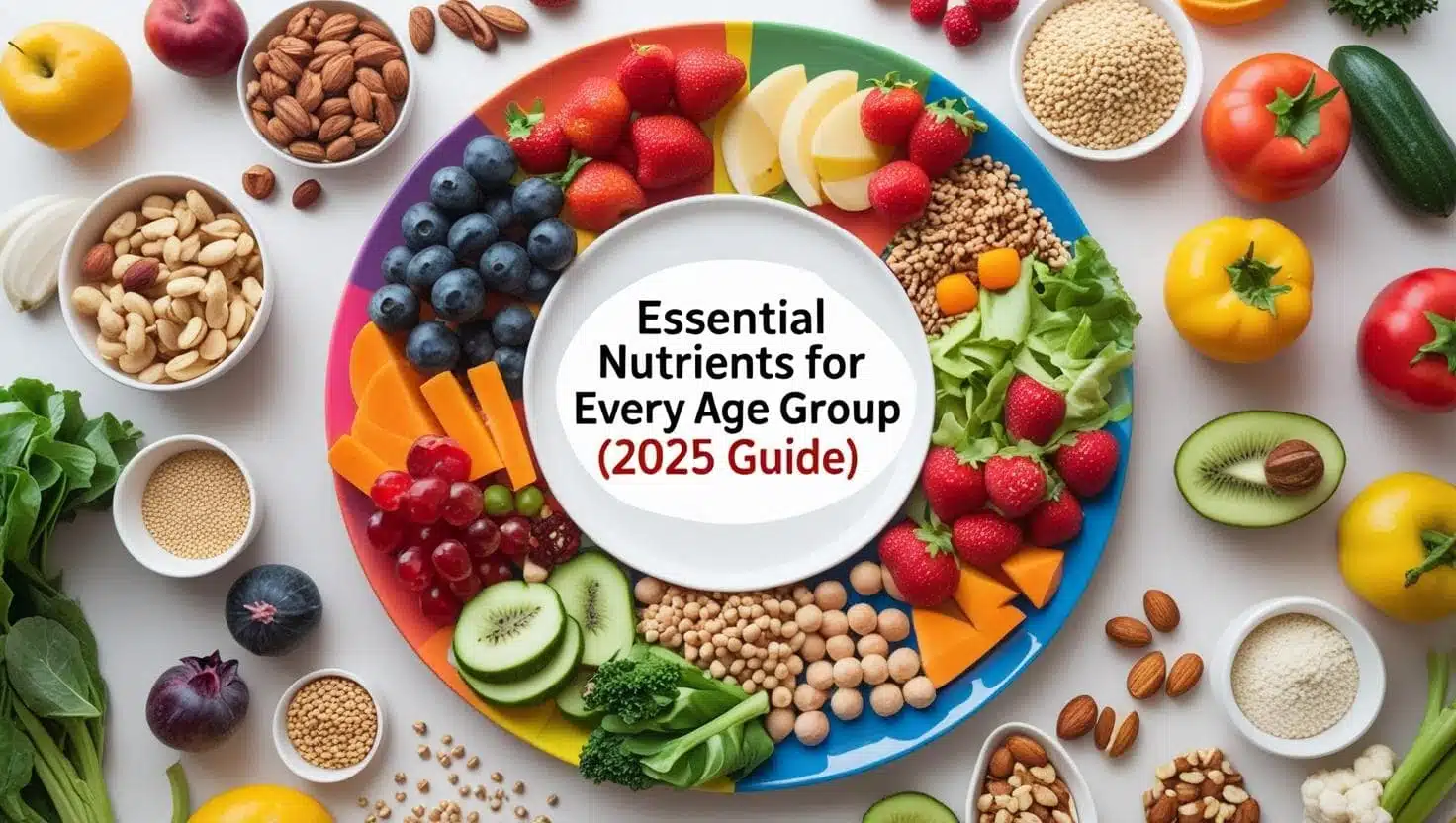
What Are Carbohydrates?
Carbohydrates or carbs are chains of sugar and starch that are present in foods such as bread, rice, fruit, vegetables, beans, and dairy products. They are the three key nutrients (corresponding with protein and fat) that provide power to the body. When you consume carbohydrate foods, your body converts it to glucose (blood sugar) to feed your cells and brain. A certain amount of glucose stores in muscles and the liver as glycogen, with any excess able to be store as fat.
There are three classes of carbs:
- Sugars (simple carbs): Simple sugars — like glucose, fructose (in fruit) and sucrose (table sugar). These digest fast and quick energy booster.
- Starches (complex carbs): Long chains of sugars that are found in whole grains, potatoes, beans and starchy vegetables. They digest slower and increase longer-term energy.
- Fiber: A complicated carb that the body can’t totally digest. It is found in whole plant foods like vegetables, fruits, legumes, nuts and whole grains. Fiber increases bulk in food so you feel full and it helps with digestion. It plays role in reducing bad cholesterol and blood sugar.
Read Also: What Is Fibermaxxing and How to Start It Safely?
How Carbohydrates Work in The Body?
Carbs are the major fuel source of body. All the body cells, particularly in the brain, operate with the help of glucose which is obtained through carbs. The brain, in fact, requires an average of 120-130 grams of glucose a day. In some cases people become bored, or unable to focus, without sufficient carbs. Good sources of carbohydrates (whole grains, fruits, vegetables, and beans) supply glucose, vitamins and minerals.
As an example, fiber-rich carbs help to prevent constipation and could guard against heart disease and diabetes. Athletes in particular are big on carbs: Reports state that carbs remain the king when it comes to intensity in exercise. Insulin helps to take glucose when you eat carbs into cells to provide energy and any excess is stored as glycogen or fat.
What Are The Health Benefits Of Carbohydrates?
Carbs are beneficial to the health in several ways:
- Energy & Activity: Carbs provide energy to perform daily tasks, school work, jobs and sports activities. Active children and adults are carbs burners. Pre-workouts foods are such like banana, almond and oatmeal.
- Brain & mood: Glucose maintains your brain active. Very low-carb diets may impair memory and lack of concentration. Carbs also help to produce serotonin to elevate mood.
- Heart: Grains, beans and fruits and vegetables contain fiber and nutrients that can reduce cholesterol and heart disease risk.
- Digestion: Carbs containing fiber keep the digestive system in good health and regularity.
- Weight Management: Carbs that are rich in fiber keep you satisfied at fewer calories. Diets rich in fruits, vegetables, and whole grains are likely to help avoid weight gain as they are filling, yet packed in nutrients.
In simple terms, good carbs provide energy coupled with a healthy heart, brain and gut.
Healthy vs Unhealthy Carbs
Not every carbohydrate is nutritionally equal:
- Good sources: Fresh fruits, vegetables, beans and whole grains, including brown rice, whole wheat bread and oats. These contain fiber, vitamins and minerals.
- Foods to minimize: Refined and sugary foods, including white bread, pastries, candy and soda. These increase glucose levels since they are deficient in nutrients. The Dietary Guidelines on Added Sugars support that they comprise less than 10 per cent of total calories.
- Portion/balance: Half of your plate with vegetables/fruit a quarter of your plate whole grains and a quarter of your plate protein. Keep serving sizes normal (A 1/2-cup of rice or one slice of bread is a serving).
By emphasizing carbohydrates eaten in their intact, unprocessed form and reducing the amount of sweets and white carbohydrates you eat. You will not only enjoy the benefits of carbs, but you will avoid their drawbacks as well.
How Much Carbs Per Day?
Your requirement in carbs varies with age, the activity level, goals. The Dietary Guidelines recommend making 45-65 percent of your total calories carbohydrates. On a 2000 calorie diet that would be between 225-325g grams of carbs per day.
The simplest rule to consume: the “healthy plate” comprised half of fruits and vegetables, a quarter of whole grain and a quarter of protein. This is typically adequate carbs (plus fiber and nutrients) allotment that many people need. People who are always on the move (such as sports people) might require a bit on the higher range to fuel their body during exercise.
Some low carb dieters use the approach to slim down or manage health. Such diets usually restrict the intake of carbs to between 25-150 g/day. Studies indicate that moderate low-carbohydrate diets (about 26 to 45 percent of calories) can improve weight and tissue markers (such as higher HDL -cholesterol levels) compared with low-fat diets.
Nevertheless, vegetables and fiber should also still be incorporated into a diet on low carbs. Having a very low-carb (keto) diet is excessive and should be done with care, with medical advice.
Read Also: Modified Keto Diet: 2025 Guide for All Ages
Carbohydrates for Athletes and Active People
Carbs are especially important in case you exercise a lot. Carbs replenish muscle stores of energy (glycogen) to make your workouts go. Sport scientists concur that the carbs are an essential requirement by the athletes as the quickest fuel to high-intensity exercises. In truth, most of active sportsmen lack carbs, which can hamper performance.
Highly active users will require more than the average amount of carbs Serious competitors should go up to 5-12 grams of carbs per kilogram of body weight per day, the experts recommend. To give an example, a 150 pound athlete may set a goal of hundreds of grams of carbs. Among non-elite exercisers, it is frequently suggested to aim at about 50-60 percent of calories consumed by healthy carbs.
To receive optimal benefits consume carbs both prior to and post-workout. For example, a pre-exercise meal of oatmeal or a banana and post-exercise rice, pasta, or potato with protein to replenish. These tactics can assist to power performance and recovery.
Carbohydrates and Diabetes
Individuals with diabetes require carbs, however, use them selectively. Type and quantity of carbs is important because all of them are transformed into glucose in the blood. Individuals with diabetes nutrition experts recommend that more effort is put into this aspect.
- Select fiber-rich carbs: 50 percent of your plate must be non-starchy vegetables (broccoli, spinach, peppers), which are a source of fiber and have little affect on blood sugar levels. Half of the plate should be reserved by these.
- Eat whole grains and legumes: Eat whole grains or legumes such as whole fruits (not just juice) or beans and lentils, brown rice, and whole-wheat bread. These carbos contain fiber nutrients and increase blood sugar at a slower rate.
- Limit refined carbs and sweets: Don’t eat the white bread, sugary cereal, soda, candy and desserts. These lead to rapid rise in blood glucose and empty calories.
- Carb counting: Counting carbs to match the insulin or other medication is also practiced by many people with diabetes. General dietary advice such as working with a dietitian can also assist in making balanced meals of carbohydrates, protein and fat.
Carbohydrates for Kids, Teens & Older Adults
Children and teens: The active sports and their developing bodies require carbs to provide energy and study. Choose whole grains, fruit, veggies, beans, and dairy. Healthy snacks may be fruit or yogurt or whole-grain crackers. Eat less of sugary food and soda- the American Heart Association recommends that girls limit the amount to less than 25g (approximately 6 teaspoons) of added sugar and boys to less than 36g (approximately 9 teaspoons) every day. Excessive added sugar may result in spikes and crashes in energy, and excessive growth.
Adults: The vast majority of adults are comfortable with the balanced plate technique. Middle-aged individuals particularly should pay attention to the presence of fiber and the quantity of food they consume. So that their energy and weight levels could be maintained at the same levels.
Older adults: Older people require fewer calories and yet they require nutrients. Vegetables, fruits, whole grains, and beans, all high in fiber, help in digestion and eliminate constipation. Aim to eat approximately 25-30 grams of fiber in a day. Calcium in dairy foods like yogurt or milk is also provided by cellulose that helps in keeping bones strong. Overall, elderly patients ought to select carbs that provide a significant number of nutrients and control portions.
What Foods Are High in Complex Carbs?
Common healthy sources of carbs include:
- Whole grains: Brown rice, quinoa, oats, whole-wheat pasta or bread.
- Fruits: Apples, berries, bananas, oranges, mangoes. Consume them in their entirety, not in juice, to ensure that sugar is low.
- Vegetables: Potatoes, sweet potatoes, corn, peas, and colorful veggies like broccoli, carrots, peppers.
- Legumes: Beans such as black beans, kidney beans, chickpeas, lentils, peas.
- Dairy: Milk and yogurt. They are found to have lactose (sugar) as well as protein and calcium.
- Nuts and seeds: Almonds, walnuts, chia seeds, flaxseeds. They contain a portion of carbs and good fats.
Examples of high-added sugar foods or refined carbohydrates to avoid: white bread, white rice, regular pasta, food cereals, sodas, candy, pastries, and snacks with added sugar.
Conclusion
Carbohydrates are an essential component of a nutritious diet of both children and adults. They provide our brains and bodies with the energy required on a daily basis. The key is to select the correct carbs – select foods supplying a lot of nutrients, including whole grains, fruits, vegetables and beans. Take the food guide: approximately 45 to 65 percent of your energy needs to be carbs, approximately 225 to 325gms when on a 2000-calorie diet. Eat half your plate of fruits and veggies, half of the other half of whole grains and protein.
Various groups of people require different quantities of carbs depending on the lifestyle. Sportsmen and active children tend to require additional carbs as a source of energy. Diabetics add carbs and eat high-fiber food. In any event, eat good carbs and not a lot of carbs. Choose whole foods of fibers rather than sweet or processed foods. Carbs are not bad. When consumed in the right form and quantity, they provide your body with energy, keep you healthy and leave you full and energized.
Frequently Asked Questions (FAQs):
Carbs alone do not cause you to gain weight. The only thing that makes you gain weight is eating more calories than you are engaging in. It is not whether those calories are carbs, fats or proteins. You can also use fiber-rich carbs to stabilize your weight such as fruits, vegetables and whole grains since they keep you full of energy.
Refined carbs are processed grains and as well as sugars that are processed to remove fiber and nutrients. They include white bread, pastries, soda and candy. They are fast to digest, raise blood sugar, and may provide minimal nutrition as compared to whole foods.
The average diabetic attempts to consume approximately 45-60 grams of carbs in each of the three meals daily. The quantity you require may however vary with your age, activity and the use of medications. Discussion with a doctor or a dietitian is advisable, in order to establish an individualized level of carbs you should have.
Disclaimer: The contents in Thenutrio.com are general informational and educational materials only. I am neither a licensed healthcare nor nutritionist. The articles rely on valid research and effective sources, but they are not to substitute consultations with qualified medical practitioner/nutritionist. For any major restructuring of your diet, health routine or lifestyle, you always should check with a licensed expert.





![[2025] Fats (Lipids): Best Choices for Every Age](https://www.thenutrio.com/wp-content/uploads/2025/09/A-vibrant-hero-image-showing-a-colorful-plate-rich-in-healthy-fats—like-avocado-toast-nuts-olive-oil—paired-with-text-overlay-2025-Fats-Lipids_-Best-Choices-for-Every-Age.-4-min-1-1.webp)





3 comments on “Carbohydrates: Energy, Health Benefits & Balanced Diet”